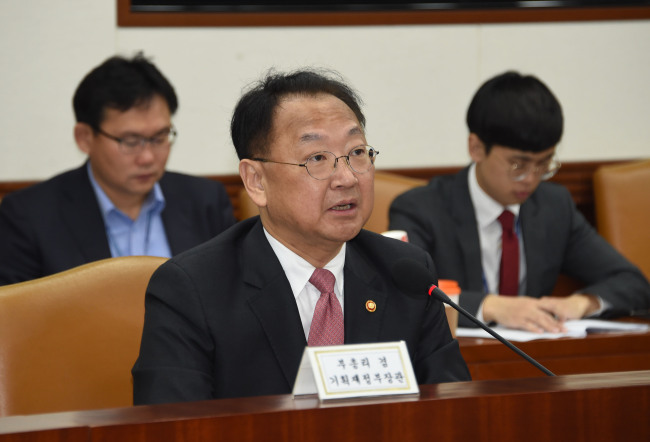Korea unveils measures to deter property speculation
By Korea HeraldPublished : Nov. 3, 2016 - 15:09
To curb the excessive rise of real estate prices, the South Korean government Thursday released a set of anti-speculation plans that include an extended ban on the transfer of home purchasing rights in affluent areas.
“The government will limit the transfer of home purchasing rights and enhance monitoring when giving prior purchasing rights to new home buyers, as well as root out illegal activities to curb speculative demand,” Finance Minister Yoo Il-ho said in an economy-related ministers’ meeting in Seoul.
“The government will limit the transfer of home purchasing rights and enhance monitoring when giving prior purchasing rights to new home buyers, as well as root out illegal activities to curb speculative demand,” Finance Minister Yoo Il-ho said in an economy-related ministers’ meeting in Seoul.

“Some real estate markets, centering on reconstruction sites in Gangnam areas, are overheated,” he said.
According to plans by the Ministry of Land, Infrastructure and Transport, the government will ban the transfer of home purchasing rights in four affluent districts -- Gangnam, Songpa, Seocho and Gangdong -- in Seoul, along with Gwacheon, Gyeonggi Province, until the buyer reports the change in ownership.
Home prices in the Gangnam district surged 5.8 percent in the first 10 months of this year, while average home prices in the country inched up 0.5 percent, the ministry’s data showed. Seocho rose 3.6 percent and Gangdong, 2.9 percent.
Speculators often seek to make profits in a short period of time by buying home purchasing rights at very low initial prices -- usually given by developers or builders before construction starts -- and then selling them to a third-party at higher market prices.
For other parts of the country, the limit on the transfer of purchasing rights will be extended to 18 months from the current six months, the ministry said.
The government, however, did not designate speculative areas such as Gangnam as “speculation zones” where capital gains taxes could be higher and restrictions on mortgage loans could be tighter.
“When the speculation zones were designated in the mid-2000s, the global economy was in a good state and there was much liquidity in the market, which posed a great threat to the surge in home prices. But this time, there is greater uncertainty in the macroeconomy,” said Park Seon-ho, head of the housing and land office at the ministry, in a press briefing.
The former government had lifted speculation zones in December 2011 to spur the then-slumping real estate market.
To enhance eligibility for apartment applications, the government said it would prevent those who are not household heads, holders of other home purchasing rights and owners of more than two houses from getting on the top priority list when competing for new homes.
Ham Young-jin, head of the research center at housing market information provider Real Estate 114, said the government’s measures will be effective in dispersing overheated demand in limited areas to other areas of the country where the transfer of purchasing rights is easier.
“The measures will surely reduce the supply of apartments as well as the competition rate for new apartments. They will also affect the construction sector, leading to ebbing effects of the construction boom,” Ham told The Korea Herald.
However, the measures are belated in preventing an oversupply of new homes, she said.
This year, 460,000 new homes were built, with about 520,000 more to be built, according to government data.
Household debt reached a record high of 1,257.3 trillion won as of the end of June, with more people borrowing at cheap rates from banks to buy new homes. The Bank of Korea had gradually lowered the base rate to a record low of 1.25 percent in five phases from August 2014 to June 2016.
By Kim Yoon-mi (yoonmi@heraldcorp.com)
-
Articles by Korea Herald




![[Herald Interview] 'Amid aging population, Korea to invite more young professionals from overseas'](http://res.heraldm.com/phpwas/restmb_idxmake.php?idx=644&simg=/content/image/2024/04/24/20240424050844_0.jpg&u=20240424200058)















